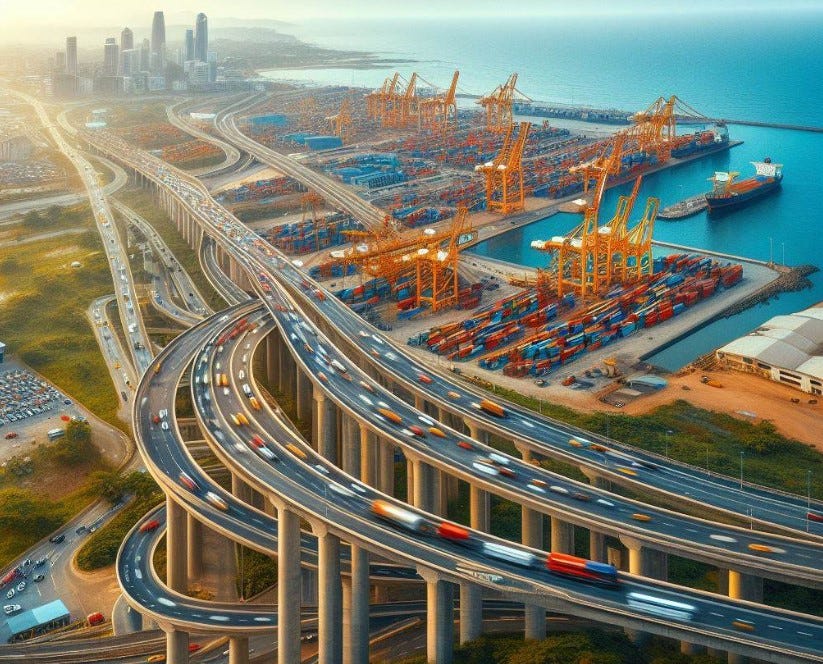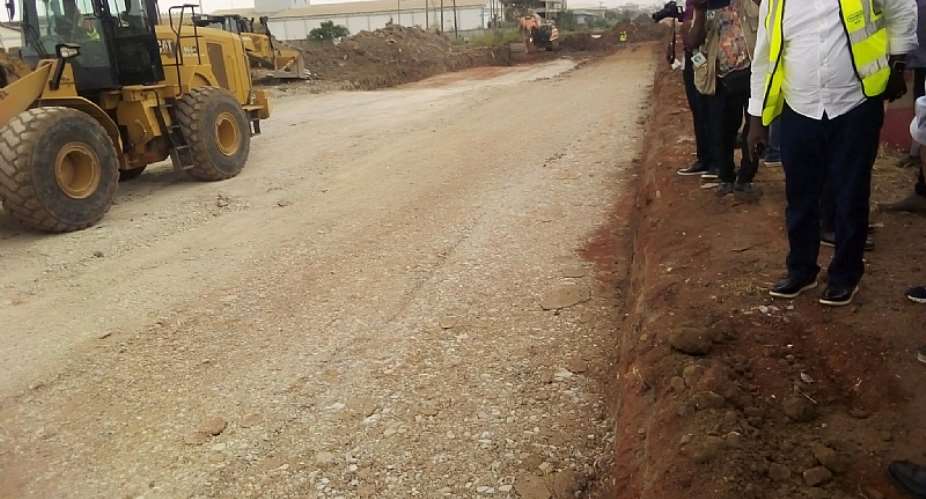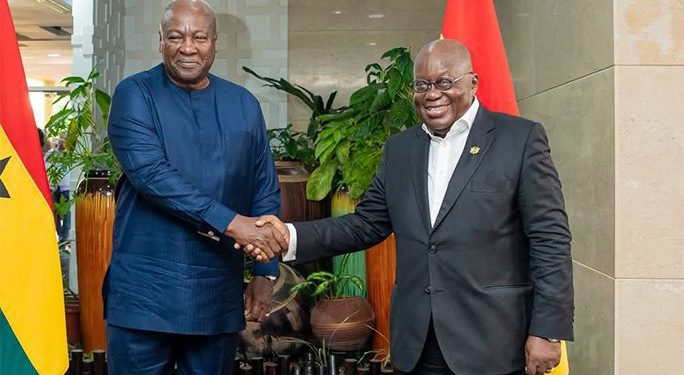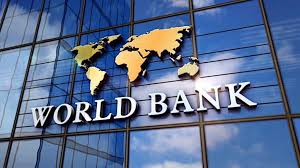Ghana, often regarded as a beacon of democracy and stability in West Africa, has witnessed significant economic transformations over the years. Known for its rich natural resources, vibrant culture, and entrepreneurial spirit, Ghana has consistently remained a focal point of regional development. However, the current economic landscape presents a mix of opportunities and challenges. As the nation stands at a crossroads, the emphasis on infrastructure development has emerged as a crucial driver for sustained growth and socio-economic transformation. The newly elected President-elect, John Mahama, has outlined bold plans aimed at revitalizing the economy, with a central focus on infrastructure. This article explores the current state of Ghana’s economy, examines the critical role of infrastructure, and evaluates promises and plans made by John Mahama and other experts in recent months.
The Current Economic Landscape in Ghana
Economic Growth and Challenges
Ghana’s economy has long been anchored by its rich reserves of gold, cocoa, and oil. Over the past two decades, the country has experienced periods of robust growth, earning it middle-income status in 2011. However, the past few years have brought economic challenges, including high inflation, currency depreciation, rising public debt, and fiscal deficits.
In 2023, inflation rates soared to over 50%, driven by global economic shocks, supply chain disruptions, and domestic fiscal mismanagement. The Ghanaian cedi depreciated significantly against major currencies, affecting import-dependent sectors and increasing the cost of living. Meanwhile, public debt surpassed 85% of GDP, prompting the government to seek debt restructuring and financial assistance from the International Monetary Fund (IMF).
Unemployment, particularly among the youth, remains a pressing issue. Despite efforts to create jobs through initiatives like the “One District, One Factory” program, many Ghanaians still face limited economic opportunities. Additionally, the agricultural sector, which employs a significant portion of the population, struggles with outdated practices, inadequate infrastructure, and climate change impacts.
Opportunities for Recovery
Amid these challenges, Ghana’s economy retains significant growth potential. The nation’s youthful population, entrepreneurial energy, and abundant resources offer a foundation for sustainable development. Moreover, strategic investments in infrastructure, technology, and education can unlock new opportunities and enhance resilience against external shocks.
The Role of Infrastructure Development in Economic Growth
Infrastructure is widely recognized as a catalyst for economic transformation. From transportation networks to energy systems, investments in infrastructure facilitate trade, attract investments, and improve living standards. For Ghana, the need for infrastructure development is particularly critical, given its growing population and urbanization trends.
Transportation and Connectivity
Efficient transportation networks are essential for economic growth. Improved roads, railways, and ports reduce the cost of doing business, enhance trade, and connect rural areas to urban markets. Ghana’s road infrastructure, while extensive, suffers from poor maintenance and inadequate funding. Major highways linking Accra to other regional capitals require significant upgrades, while rural areas often lack all-weather roads.
The development of railways has been identified as a priority. The Ghana Railway Development Authority has ambitious plans to revive and expand the rail network, connecting the northern and southern regions and enhancing regional trade through the African Continental Free Trade Area (AfCFTA).
Energy Infrastructure
Access to reliable and affordable energy is a cornerstone of industrialization and economic growth. Ghana has made notable progress in expanding electricity access, achieving a national electrification rate of over 80%. However, challenges persist in ensuring reliable supply and addressing the high cost of energy.
The energy sector requires significant investments in renewable energy sources, such as solar and wind, to diversify the energy mix and reduce dependence on thermal and hydroelectric power. Additionally, improving the efficiency of transmission and distribution systems can minimize losses and enhance supply reliability.
Digital Infrastructure
In today’s digital age, technology infrastructure is a critical enabler of innovation and economic growth. Expanding internet access, investing in data centers, and promoting digital literacy can position Ghana as a hub for technology and innovation in Africa. The government’s initiatives, such as the Digital Ghana Agenda, aim to create an inclusive digital economy, but more needs to be done to bridge the urban-rural digital divide.
President-elect John Mahama’s Vision for Infrastructure Development
John Mahama, a seasoned politician and former president, has returned to the helm with a vision to address Ghana’s economic challenges through strategic investments in infrastructure. During his campaign, Mahama emphasized the importance of infrastructure as a foundation for economic recovery and growth. Key promises made by Mahama include:
Enhancing Transportation Networks
Mahama has pledged to prioritize the development of roads, railways, and ports to improve connectivity and facilitate trade. His administration plans to complete stalled road projects, such as the Eastern Corridor Road, and invest in new highways to reduce congestion in urban areas. The revival of the railway sector is also high on his agenda, with a focus on creating an efficient and integrated rail system.
Expanding Energy Infrastructure
To address the energy sector’s challenges, Mahama has promised to invest in renewable energy projects and expand electricity access to underserved areas. His administration aims to promote public-private partnerships (PPPs) to attract investments in solar, wind, and biomass energy projects. Additionally, Mahama has committed to enhancing the capacity of the Ghana Grid Company (GRIDCo) and the Electricity Company of Ghana (ECG) to ensure reliable power supply.
Investing in Health and Education Infrastructure
Recognizing the importance of human capital development, Mahama has outlined plans to invest in health and education infrastructure. His administration aims to build new hospitals, upgrade existing facilities, and improve access to quality healthcare services. In the education sector, Mahama has promised to construct additional schools, provide modern learning resources, and expand access to vocational training.
Promoting Regional Development
Mahama’s vision includes a focus on balanced regional development to bridge the gap between urban and rural areas. Through initiatives like the “Infrastructure for Poverty Eradication Program,” his administration plans to allocate resources to underserved regions and promote equitable development.
Perspectives from Experts and Stakeholders
Infrastructure development has received widespread support from experts and stakeholders as a key driver of Ghana’s economic recovery. Dr. Joe Abbey, an economist and executive director of the Centre for Policy Analysis, emphasizes the importance of fiscal discipline and efficient project execution to maximize the impact of infrastructure investments.
The Ghana Institution of Engineers (GhIE) has called for increased funding for infrastructure maintenance to ensure sustainability. Additionally, civil society organizations have highlighted the need for transparency and accountability in the procurement and implementation of infrastructure projects.
International partners, such as the World Bank and African Development Bank, have also pledged support for Ghana’s infrastructure agenda. These institutions recognize the potential of infrastructure investments to enhance productivity, create jobs, and improve living standards.
The Way Forward
While infrastructure development offers immense potential, its success depends on effective planning, execution, and management. To realize the vision outlined by President-elect Mahama and other stakeholders, the following measures are essential: Strengthening Public-Private Partnerships: Collaborations between the government and private sector can mobilize resources, share risks, and enhance efficiency in project delivery. Ensuring Fiscal Discipline:
Sustainable financing mechanisms, coupled with prudent fiscal management, are critical to avoiding excessive debt burdens. Promoting Local Content: Encouraging the use of local materials, labor, and expertise can maximize the economic benefits of infrastructure projects.
Enhancing Transparency and Accountability: Robust governance frameworks can ensure that infrastructure investments deliver value for money and meet the needs of citizens.
Integrating Climate Resilience: Infrastructure projects must incorporate climate-resilient designs to mitigate the impacts of climate change and enhance sustainability.
Conclusion
Ghana’s economic challenges require bold and strategic solutions, and infrastructure development stands out as a key enabler of future growth. President-elect John Mahama’s ambitious plans, coupled with the insights of experts and stakeholders, offer a roadmap for revitalizing the economy and improving living standards. By addressing infrastructure gaps and leveraging the nation’s resources and potential, Ghana can chart a path toward inclusive and sustainable development. The journey ahead requires collective effort, visionary leadership, and unwavering commitment to building a brighter future for all Ghanaians.
Written by: Wilson Ronnie Odoom, Expert contributor to Ghana Infrastructure News





